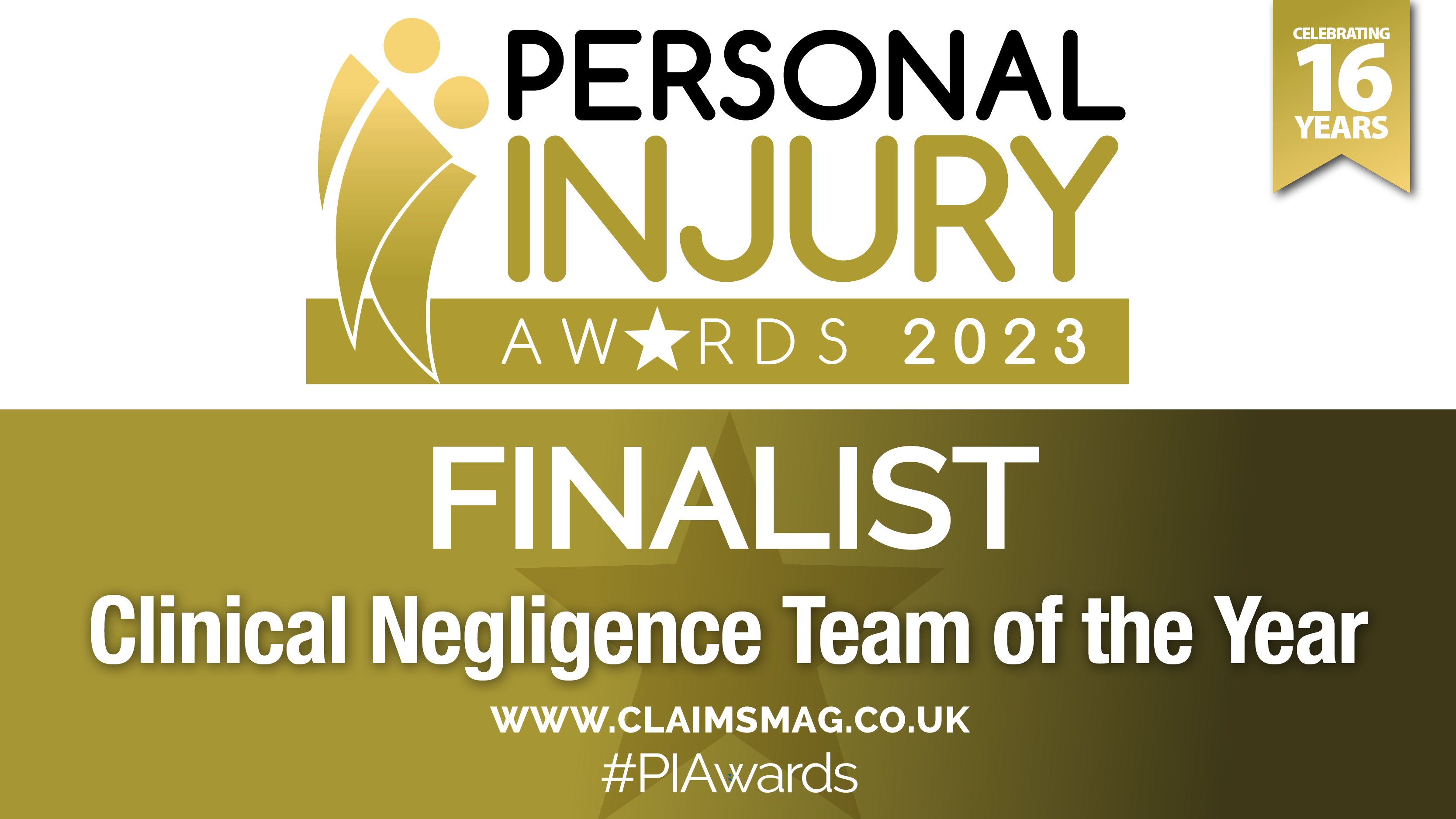Personal
Clinical Negligence Solicitors
Our dedicated clinical negligence team offer the very highest standards of clinical negligence legal advice on a no win no fee basis. If the claim is for an injured child, we do not charge a success fee.
SOLVING PERSONAL LEGAL MATTERS

Services for Clinical Negligence
We provide Clinical Negligence services in the following areas:
View more
View less
Forbes Solicitors' clinical negligence solicitors offer expert legal advice to individuals who have suffered harm as a result of medical treatment. Our highly experienced clinical negligence claims lawyers team can assist with all kinds of clinical negligence issues, including misdiagnosis, surgical errors, and birth injuries. Our clinical negligence solicitors understand the impact that taking the brunt from an act of clinical negligence can have on individuals and work closely with our clients to achieve the best possible outcome.
What is Clinical Negligence?
Clinical negligence is when a health care or medical professional causes physical injury or mental harm to you because they deviated from the standards in their profession. There are numerous ways that clinical negligence can occur from misdiagnosis to incorrect treatment and surgical mistakes.
What is a Clinical Negligence Claim?
Clinical negligence claims are legal proceedings where a person alleges that they have suffered harm as a result of substandard medical care. They can involve a range of medical treatments and procedures, including misdiagnosis, incorrect treatment or surgery, or failure to obtain informed consent.
If you have suffered due to clinical negligence, the expert solicitors at Forbes are on hand to help. We're able to offer a range of full and comprehensive legal advice which will ensure you receive the compensation amount you deserve.
Clinical negligence claims (otherwise known as medical negligence claims) takes place when a patient takes a medical professional to court to claim compensation after an act or acts of negligence were experienced during their medical treatment or care.
Our Clinical Negligence Solicitors know that making a claim for clinical or NHS medical negligence can be daunting, especially when you have already been through a stressful and unpleasant time. That's why we aim to investigate the nature of the problem, advise you as to what you may be entitled to and then take care of the compensation claims process for you. This ensures a prompt resolution of your problems, all in a friendly and compassionate atmosphere.
Ensuring a Professional Service
At Forbes, we have a dedicated team of Clinical Negligence Solicitors and litigation Lawyers with a wide range of experience in all types of claims against health care authorities and professionals, including those at private clinics. We are one of only a few law firms in the North of England with a Legal Aid Agency Clinical Negligence Franchise. This award allows only an elite number of highly qualified solicitors to apply for Legal Service Commission Funding (formerly Legal Aid) to handle clinical negligence cases.
Our expert Solicitors deal with all types of compensation claims regarding medical negligence by dentists or GPs, or NHS and private hospitals, as well as clinical negligence claims for many procedures.
The Claims Process
There is usually a 3 year time limit on compensation claims starting from the date of your incident, so it's important that you act quickly and seek advice from expert clinical negligence solicitors as soon as possible. Forbes can offer a free consultation and help you discern as to whether you have a claim and advise you on the best course of action. Medical negligence can have a detrimental effect on your life, so if you feel you have been mistreated in any way, it's important you seek legal support.
Whether it's long-term rehabilitation you require, adjustments to living arrangements, therapeutic support or financial provisions to pay for the avoidable suffering, our team are dedicated to providing you with a straightforward, stress-free service.
Read about our #LeonasStory campaign - we are looking to raise awareness of the effects a brain injury can have on our own lives and the lives of others.
You should seek legal advice from clinical negligence solicitors if you think you have a case for a clinical negligence claim, because proving a case can be difficult. If you win the medical negligence claim the law allows you to get compensation to compensate for your losses.
Additional Information
Can I make a Clinical Negligence Claim?
If you have reason to believe that you or your loved ones have been injured as a result of clinical negligence contact the expert clinical negligence solicitors at Forbes on 0800 037 4625 for free initial advice and start your no win, no fee compensation claim today.
When you contact the expert clinical negligence solicitors at Forbes we will discuss the extent of your injuries with you and try to ascertain who might be to blame for those injuries.
Here we will need to decide who is at fault, at which time you may hear us talk about "breach of duty". This is where we will try to determine whether your care fell below the high standards expected of medical professionals. We will talk about your claim with you and figure out whether a medical professional has caused you more harm than good as a result of their incompetence. This part is called "causation" or "avoidable harm" and is where we try to prove that the care itself, not the illness, has caused the injury.
Time limits
There are strict time limits placed upon clinical negligence claims but these may vary depending on the age of the patient. Patients are usually required to start a compensation claim within 3 years of their injury, or within 3 years of when they discover their injury was the result of clinical negligence.
In cases where a child under 18 has suffered clinical injury, the time limit starts from the date of their 18th birthday.
It's vital that you contact the expert solicitors at Forbes as soon as possible as these time limits are strictly enforced.
For more information on making a clinical negligence compensation claim, contact the expert no win no fee clinical negligence solicitors at Forbes today.
All initial advice is completely free and all cases are handled on a no win, no fee basis.
How to fund a Clinical Negligence claim
One of the most common questions we get asked at Forbes is "How do I pay for my clinical negligence compensation claim?". There are a number of possible options.
No Win No Fee
Many of our clinical negligence compensation claims undertaken by our specialists can be handled on a no win, no fee basis, which means when we decide to take on a claim, we do so believing we will win.
A no win, no fee agreement is also known as a Conditional Fee Agreement or CFA and is a better option for those who may not be able to afford legal fees. We will always discuss the best option for you and will collect as much evidence as possible before pursuing a claim to ensure there is a high probability of success.
If you win your claim the other side will pay for legal costs. We may take a small percentage from your compensation to cover the risk of losing. This will all be explained to you during our initial consultations so you are made aware of the costs involved and any of the risks.
Legal Aid
Forbes Solicitors can also offer representation via Legal Aid for serious birth injury cases. We are one of only a few law firms in the North of England with a Legal Aid Agency Clinical Negligence Franchise. This award allows only an elite number of highly qualified solicitors to apply for Legal Service Commission Funding (formerly Legal Aid) to handle clinical negligence cases.
Private services
In some circumstances your compensation claim may not be suitable for a no win, no fee basis. In this case we can discuss our charges which will based on an hourly rate.
As always there are no hidden costs when you instruct us to pursue a claim and your best interests are at the heart of everything we do.
Contact Us
Get in touch to see how our experts could help you.
Contacting Us
Monday to Friday:
09:00 to 17:00
Saturday and Sunday:
Closed
FAQs
Claiming for Clinical Negligence may sometimes seem like a complicated or confusing process, which gives rise to a number of questions and queries. Read our FAQs below to get all the basic information that you need about clinical negligence.
What is Medical Negligence?
The term medical negligence (also known as clinical negligence) is usually defined as a breach of a duty of care from a health professional that has resulted in harm and loss. The NHS defines it as "a breach of duty of care by members of the health care professions employed by NHS bodies." Of course, it is also possible to bring a medical negligence claim against private healthcare providers such as private hospitals, care homes and GPs and dentists.
For there to be a valid medical negligence case the breach of care must have caused harm or damage to the patient. Medical negligence can take a number of forms such as:
- Misdiagnosis
- Incorrect treatment
- Surgical mistakes
- Prescribing inappropriate medication
- Damage to child before, during or after birth
- Not giving a person the treatment they need
- Not being told about the risks of a proposed treatment
- Delay in the provision of appropriate treatment
Medical professionals have a duty of care to their patients and when this is breached it may be possible for you to claim compensation for medical negligence. The aim of a medical negligence case is to award damages (compensation) to put the injured party back in the position financially that they would have been in had it not happened. A The court is not able to change the working practice, improve care standards, make the trust or an individual apologise and cannot discipline a medical professional. A successful claim is likely to encourage those responsible to revisit their practice to prevent something similar from happening again.
When it comes to medical negligence, the burden of proof falls on the person bringing the claim. In order to have a successful claim the claimant or their solicitor will need to prove the following:
- The healthcare professional owed a duty of care to the claimant
- There was a breach of that duty of care
- That the breach has caused harm to the claimant
- Damages for injuries and other losses (such as loss of earnings) have resulted from the harm caused by the breach of care
If you wish to bring a claim against a medical professional or organisation it is highly recommended to hire an experienced medical negligence solicitor.
Do I have a clinical negligence claim?
A clinical negligence claim is only possible if at least some fault can be found against the hospital, doctor or other medical professional. Only if fault, or a 'breach of a duty of care', can be proven, and that breach has caused some additional harm, will your claim have a chance of being successful. It is not enough that the treatment offered did not succeed or did not work as had been hoped.
If you do think you have a clinical negligence claim, then this will probably have to be confirmed in writing by an independent medical expert, unless the medical professional admits a breach of duty and that breach has caused additional harm.
The legal test for a Clinical negligence cases is based on the issue of whether it can be proved that no reasonable medical practitioner practicing in their particular field of medicine would have provided that treatment for that particular condition at the relevant time. In other words if you were to ask a number of doctors practicing in a particular area whether they would have done the same thing and the majority say yes they would, then there is no negligence. If on the other hand that same majority say the treatment was not acceptable then it would be considered negligent. This is known as the 'Bolitho test', which has followed the 'Bolam Test'.
For a free consultation please contact our Clinical Negligence Solicitors on freephone 0800 975 2463 or contact us by email today.
How to claim medical negligence in the uk
Making a claim for medical negligence, also known as clinical negligence compensation in the UK, can be complex and take 12 months or more. To pursue a clinical negligence claim, you must prove that a medical professional failed to carry out their responsibilities (this is known as fault or breach of duty) and that this caused you harm and suffering; this is known as avoidable harm or causation.
To ensure you get the compensation you deserve, your medical negligence solicitor will need to have a full and thorough understanding of how the results of the negligence have impacted your life. This may involve the following:
- Taking detailed statements
- Obtaining full copies of your medical files
- X-rays and scans (if needed)
- Seeking expert medical opinion form an expert away from the local area
- An examination by an independent medical professional
All of this will need to be done thoroughly to ensure success; this can mean that it takes time and depending on the nature of the negligence, it could be upsetting. However, Forbes' capable clinical negligence solicitors will help you arrange all of this and advise you all the way through the process. In very rare cases, you may need to go to court; if this does happen, we will be there to help you.
When claiming for medical negligence, compensation is not always what a person wants; some want an apology, others may want to see justice served so that no one else will suffer like they did. However, there is no guarantee you will get this. Putting forward a medical negligence claim may only provide you with financial compensation, if successful. Sometimes, an organisation may agree to compensation but will not agree to admit liability. In this event, our solicitors will be able to advise you what the best course of action is.
Will a clinical negligence claim cost me anything?
It is possible that a clinical negligence case may cost you something, however, if your claim is successful, it is likely that most of your legal fees will be paid for by the defendant (for example the NHS Trust responsible for the negligence).
How much will I get for a clinical negligence claim?
How much you will get for a clinical negligence claim, if successful, will depend on the severity of the injury and loss caused by the negligence, how this will affect your future care needs and loss of earnings; this can include past and future earnings too.
If the negligence you have suffered has permanently harmed your quality of life, you may be able to receive compensation that will continue to pay out over your lifetime to ensure that you are cared for properly. Compensation can also include payment for a suitable home, and/or adaptations to it , vehicle, aids and other equipment, care and therapy you may need. Substantial awards are often paid partially in a lump sum and then followed by periodical payments.
When claiming for loss of earnings you will need to declare how much time you had to take off work.
Use our Personal Injury Compensation Calculator to find out how much you can claim for your injuries. For a free consultation contact our Clinical Negligence Solicitors on freephone 0800 975 2463 or by email today.
How long will a clinical negligence claim take?
As clinical negligence claims can be highly complex, it can take a long time for the process to be completed. At best, it may take 12 months to 18 months; for particularly complex cases, it may take years. If the other party admits negligence, then proceedings may take less than a year to resolve.
Where liability has been admitted it might be possible to obtain an interim payment that represents a reasonable proportion of your claim. This can provide some compensation until the true value of the claim can be calculated.
The process takes time because your claim must be thoroughly investigated and evidence gathered. You may also need to be examined by one or more medical experts. If the seriousness of your condition is still unclear, then the case may be delayed as you may need further medical examinations.
Once the evidence has been presented to the defendant involved, they may want to get their own medical evidence which will also take time. Another reason clinical negligence claims take so long is because compensation payments in themselves can be complex. Medical negligence can affect your life in many different ways. For example, it could be possible to claim for some, or all of, the following
- Pain and suffering
- Loss of amenity
- Loss of past & future earning
- Reduced employment prospects
- Cost of care
- Medication (if required)
- Private health care (if required)
For a free consultation call freephone 0800 975 2463 and ask to speak with a Clinical Negligence Solicitor or contact us by email today.
How to report medical negligence
There are different rules for reporting medical negligence depending on whether you received treatment on the NHS or in the private sectors.
How to report medical negligence to the NHS
If you think you or a relative has suffered medical negligence at an NHS institution then you can complain to the NHS, but this is not compulsory. It can, however, be helpful as it may give you more information about what happened. Unfortunately, knowing who to complain too is not always straight forward. It is possible to complain to the NHS service provider directly (i.e GP, dental surgery, or hospital) You can also contact your clinical commissioning group (CCG) regarding secondary care, which includes hospitals, mental health services, out-of-hours services, NHS 111 and community services - district nursing, for example.
If you do not wish to go down the NHS complaints procedure, then you can take legal advice from a qualified medical negligence solicitor and they can begin your claim.
If you feel that your complaint has not been resolved by the NHS, you can complain to the Parliamentary and Health Service Ombudsman. For more information on how to complain to the NHS click here.
How to report medical negligence when you have received private care
When it comes to reporting medical negligence in private care there is no formal procedure. Private Doctors, such as GPs, will have insurance against such mistakes. Unfortunately that is not true of all medical staff in the private sector and particular caution should be applied for example when chosing a plastic surgeon to check that they are insured. A private hospital or care home will also have their own complaints procedure. Usually, in a medical negligence case against a private healthcare professional the individual practitioner will be named as the defendant. If they are an employee of a private hospital or care home, it will be the name of the hospital or care home who will be the defendant.
Whether you have received either public or private care, do not delay in seeking legal advice. There are strict time limits for bringing a claim to Court.
How to prove medical negligence
To prove medical negligence the burden of proof lies with the claimant. There must also be proof that a duty of care has been breached and the patient concerned has suffered physical and/or mental injury as a result. It cannot be enough that treatment was not a success, or did not work as hoped. It is also not possible to claim compensation just because someone did something wrong - it must have caused you or the patient concerned harm.
To have a successful claim you and your medical negligence solicitor will need to prove the following:
- That the healthcare professional owed a duty of care to the claimant not to cause injury
- There was a duty of care breach
- That the breach of duty of care has caused harm to the claimant
- Damages and other losses (such as loss of earnings) have resulted from the harm caused by the breach of care
What can be most difficult with medical negligence cases, is proving that harm has been done by negligence and not by any underlying condition.
When trying to prove a breach of duty of care, each medical negligence case will need to pass the 'Bolitho test' and the 'Bolam Test'. These tests look at what ought to be done and what most other practitioners would have done in the same circumstances.
If we take on your case, we will need access to your medical records and these will need to be checked both by a solicitor and by an independent medical expert, who will compile a detailed report.
What is the time limit for medical negligence claims?
The time limit for bringing legal proceeding for medical negligence, which has resulted in harm, either physical or psychiatric, is three years. It is possible, under some exceptional circumstances for this deadline to be extended. The three-year time limit is set out in the Limitation Act 1980.
The three years start from the date of the negligence or from the date that the person who has been harmed by the negligence has knowledge of certain facts, which make up the claim.
There are a couple of exceptions to the three-year time limit rule:
- There are different rules for children. The three-year time limit will only start from the date of their 18th birthday
- If a person has experienced negligence when they were unable to deal their own affairs, the time limit only starts when they regain their capacity to do so
- The court can allow a claim that falls out of the three-year deadline to proceed if they think there is good reason for the delay
It is always recommended to approach a medical negligence solicitor as soon as possible. Leaving it close to the end of the three-year period is not advisable. Your solicitor needs ample time to investigate the claim and prepare the case before a claim can be issued. Also, the sooner a case of medical negligence can be investigated, the higher the likelihood that relevant documents still exist or are easily accessible and those involved will be able to remember more clearly what happened.
What is classed as medical negligence?
The basic definition of medical negligence is a breach of a duty of care from a health professional that has resulted in harm and loss. Of course, while the vast majority of medical organisations and professionals offer outstanding care, things can sometimes go wrong.
Medical negligence can be classed as one of the following. Please note that is not an exhaustive list:
- Misdiagnosis
- Incorrect treatment
- Surgical mistakes
- Prescribing inappropriate medication
- Damage to child before or during birth
- Not giving a person the treatment they need
- Not being told about the risks of a proposed treatment
A case can be brought against any NHS or private health professional, whether they are a:
- Nurse
- Doctor
- Surgeon
- Paramedic
- Physiotherapist
- Phycologist
- Dietician
- Dentist
Please note that this list is not exhaustive.
A medical negligence case can also be brought against a medical organisation such as:
- NHS trust
- Private hospital
- Care home
- Mental health services
- Dental practice
(Again not an exhaustive list)
At Forbes, we will listen to your experience and if we think you have a case; our qualified solicitors will be with you every step of the way. To speak to a solicitor about medical negligence contact Forbes today.
Need more help?
Get in touch to see how our experts could help you.
Our Reviews
Our dedicated Clinical Negligence team

Useful Information
Article
Clinical Negligence Resulting in Death: Understanding Compensation Claims
05 Mar 2024
When a loved one suffers harm or loses their life due to medical negligence, it can be an emotionally…
Article
The True Cost of Maternity Claims
06 Feb 2024
Maternity claims involve a wide variety of conditions that can develop during pregnancy and labour and…
Article
Allegations of Negligent Treatment at Royal Sussex County Hospital
05 Jan 2024
A recent Police investigation into Royal Sussex County Hospital in Brighton, 'Operation Bramber,'…
Contact Us
If you have a general enquiry then please fill in your details and someone will contact you.
Contacting Us
Monday to Friday: 09:00 to 17:00
Saturday and Sunday: Closed













